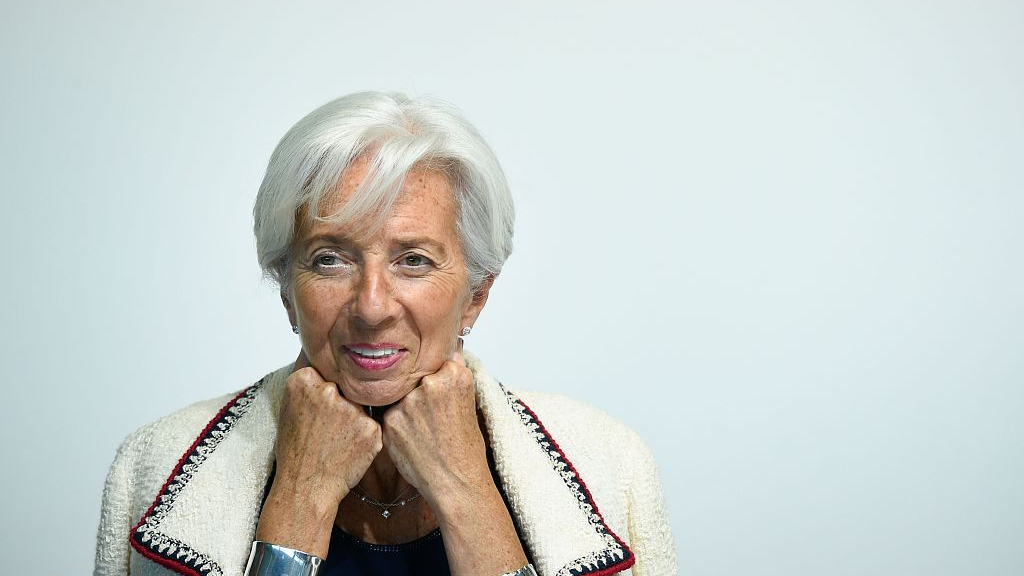
Christine Lagarde, then IMF managing director at a press conference at the European Union headquarters in Luxembourg, November 1, 2019. (Photo: VCG)
If the same monetary policy has not worked for more than eight years, its result will yield no more than stagnation. This is exactly what is happening in the euro zone, where monetary policy is losing its efficiency — and the European Central Bank's (ECB) new chief Christine Lagarde is calling for a change.
Monetary easing hasn't been working well since 2011
The ECB has kept its benchmark lending rate at zero since early 2016, meaning that euro zone countries can almost borrow for free. However, this ultra-loose monetary policy has failed to lift growth activity as it did in 2009 after the global financial crisis. Data shows that euro zone's gross domestic product (GDP) on a quarter-on-quarter basis has been trending lower in past three years.
Despite the ECB cutting the deposit rate again last month, Friday's PMI data confirms that the ongoing slowing down is almost warranted. IHS Markit's euro-area composite PMI dropped to 50.3 in November from 50.6 in October, suggesting that the tepid manufacturing activity may have already transmitted into the services sector. The German manufacturing PMI for November rose slightly from the previous month, but the downward trend still looks intact.
The reason why this monetary policy in the euro zone didn't work is that it fails to spur on demand. From 2011 to 2014, the ECB cut its benchmark lending rate by 145 bps to 0.05 percent in this period. Unfortunately, commercial banks' lending activities still kept sliding in this period.
As the bloc's deposit rate is at a negative reading, a further cut will only harm consumers' savings and confidence, offering no help to boost the inflation in the region. In a zero or negative interest rate environment, commercial banks' net interest rate margin significantly shrinks beyond an adequate risk, reducing their willingness to increase lending.
ECB's Christine Lagarde wants to be a "game changer"
The new ECB chief Christine Lagarde clearly understands that the institution's monetary policy is running out of space and further monetary easing may only have the negative impact on the real economy.
In her first public speech as the president of the ECB, Lagarde stressed that "monetary policy shouldn't be the only game in town, and it's clear that monetary policy could achieve its goal faster and with fewer side effects if other policies were supporting growth alongside it." She also stressed the need for the bloc to move towards a new policy mix to drive the internal growth of the euro zone.
It's obvious that the "other policies" Lagarde was referring to are fiscal stimulus. The current level of public spending in the 19 country bloc is still below the pre-crisis amount more than a decade ago, so it's reasonable to call for more fiscal measures.
However, fresh fiscal stimulus has been one of the most challenging tasks to be implemented in euro zone for many years. Nations booking a budget surplus, such as Germany and the Netherlands, have always refused to substantially increase their fiscal measures. Without fiscal expansion from these two countries, heavily indebted countries such as Italy, Greece and Portugal will continue to drag on growth in euro zone.
The good news now is that Germany, whose growth heavily relies on the manufacturing and exports, is in a recession risk. Due to slowing global auto sales and ongoing US-China trade tension, Germany nearly fell into a technical recession in third quarter. In response to this, its government only recently agreed to increase its public spending.
But, we need to admit the fact that such size of the fiscal stimulus is far from enough to lift the broader euro area growth. For now, German growth is not weak enough to trigger imminent large scale fiscal measures. In order to convince the German government to implement more public spending, the ECB's Christine Lagarde has a new role to play. The German economy needs a longer-term investment package to improve infrastructure, digitalization and education. The ECB can come out with plans to further lower German's borrowing costs through some unconventional policies, such as purchasing more bonds — not only limited to government bonds but commercial banks and corporate bonds as well.
For Christine Lagarde, implementing monetary policy alone as in the era of her predecessor Mario Draghi won't work. In comparison to Draghi, many of those who've worked with her in the arena of international diplomacy believe that she could be a more suitable leader for the institution. Lagarde is arriving at the right time to take advantage of her previous network made as head of the International Monetary Fund, and change the ECB to become more efficient.
In 2008, the ECB cut interest rates aggressively amid the global financial crisis and its GDP recovered quickly after that. The monetary policy worked at that time because the European Union approved for a coordinated stimulus of 200 billion euros, similar to Christine Lagarde's "policy mix" plan.
Editor's Note: Jimmy Zhu is a chief strategist at Fullerton Research. The article reflects the author's opinions, and not necessarily the views of CGTN.


